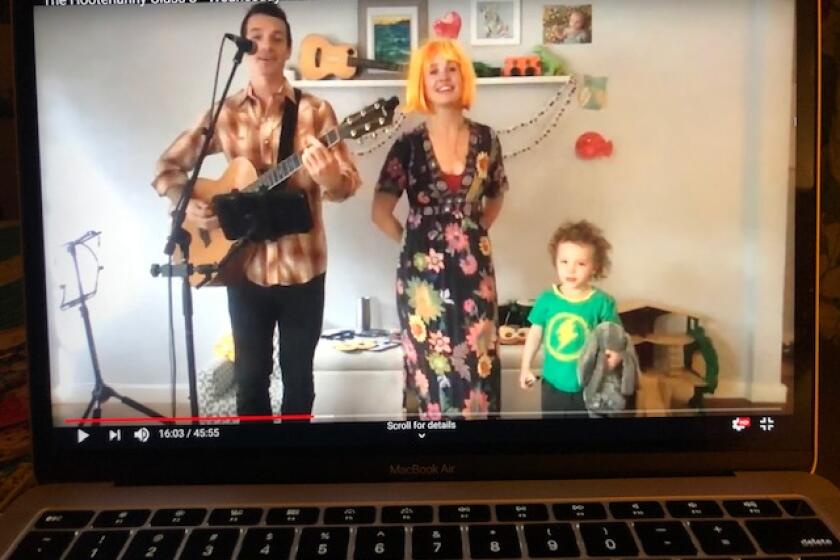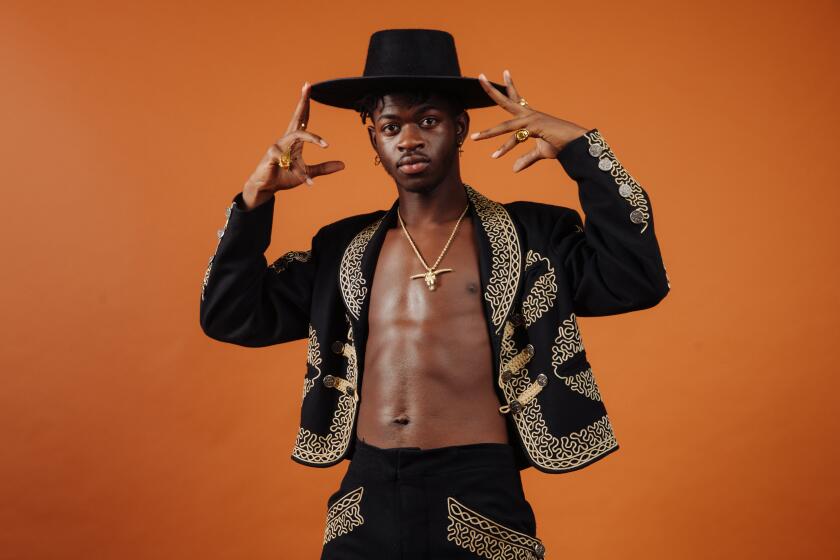Pandemic pop: At home and around the world, dark-humored new songs about coronavirus go viral

Gmac Cash’s “Coronavirus”: “I’ma chill at the crib ‘cause I’m safe here ... I’m ‘bout to stay at the crib for about a year.”
- Share via
It should probably come as no surprise that the first hit song to deal with the COVID-19 pandemic is, yes, a viral phenomenon. It is also not surprising, to anyone who has paid attention to pop culture in recent years, that Cardi B, the irrepressible rapper and entertainer, has a hand — or, rather, a raspy, emphatic voice — in the new anthem.
“Coronavirus (feat. Cardi B)” began its life as ashort video, posted on Instagram, in which Cardi B airs her fears of COVID-19 with a typical mix of screwball humor and curse words. The clip ends with Cardi B bursting into a singsong chant: “Coronavirus! Coronavirus! I’m telling you, s— is real! S— is gettin’ real!” The video captivated the internet, and DJ iMarkkeyz, a producer from Brooklyn who specializes in setting memes to music, quickly assembled a remix, placing Cardi B’s exclamations over a skittering trap beat punctuated by the sounds of coughing and panting.
The result is comical and eerie, a song that plays the coronavirus for dark laughs while capturing the dread that everyone, everywhere, is experiencing — the sirens wailing in our heads as we confront a terrifying and invisible menace.

What will the playlist of the COVID-19 crisis sound like? There are historical precedents, but they may offer little in the way of guidance. The Middle Ages and Renaissance produced a body of “pestilential music”:motets, madrigals and other compositions responding to the horrific plagues of those times. The global pandemic of a century ago, the 1918 Spanish flu, left a small imprint on American popular music in songs like the ragtime instrumental “The Microbe” and the show tune “Influenza Blues,” novelty ditties reflecting the brazenness with which Tin Pan Alley glommed onto anything topical.
John Legend, Pink, Patti Smith and Coldplay’s Chris Martin are among the singers giving concerts to fans on social media during the coronavirus shut-in.
A more serious reckoning is “The 1919 Influenza Blues,” a number that circulated for decades among blues singers.Elsie Jenkins’ boogie-woogie version, recorded in 1962, describes victims wracked by fever and borrows the language of biblical prophesy to cast the pandemic as divine vengeance:
It was God’s almighty plan
He was judging this old land
North and south, east and west
It can be seen
It killed the rich, killed the poor
It’s gonna kill just a little more
If you don’t turn away from your shame
The HIV/AIDS epidemic of the 1980s and 90s had its own musicalcanon. Many songs, like George Michael’s “Jesus to a Child” and the Communards “For a Friend” struck an elegaic tone. Politics, and the grim details of suffering and death, surfaced occasionally: Wu-Tang Clan’s “America” (1996) described patients hooked up to respirators and called the AIDS crisis “government made.” But the stigma and homophobia surrounding the disease discouraged full-throated protest. Most AIDS songs are circumspect and euphemistic: chronicles of a scourge that shall not be named.

In troubled times, we turn to music for many reasons: for solace, for distraction, to calm the nerves, to touch the spiritual and ineffable. We seek comfort in tradition: in familiar melodies and lyrics, in the instant nostalgia trips and sense of belonging that beloved songs can provide. The coronavirus crisis has already produced indelible moments of musical communion. Countless online videos have captured scenes of Italians under lockdown, playing and singing from apartment windows and balconies, their voices echoing in unison across abandoned streets. In Rome,neighbors belted out the anti-fascist folk song “Bella Ciao”; a viral clip filmed in Siena captureda spooky nocturnal singalong of a local anthem, “E Mentre Siena Dorme” (“And While Siena Sleeps”). These serenades have a primal purity, exemplifying the age-old power of songs to unify and console.
Of course, sometimes a big singalong of a favorite tune can fall flat. On Wednesday, the movie star Gal Gadot posted her ownInstagram video, amontage of celebrities taking turns crooning John Lennon’s “Imagine.” It was a “We Are the World” for the age of quarantine, or a kind of parody thereof: a ragtag chorus of famous people with dubious musical pitch, singing, after a fashion, into their cellphone cameras. The thing is obviously well-intentioned, but the optics are hard to take. In the midst of a global public health catastrophe that is crashing the economy and underscoring gross inequities, images of wealthy actors and musicians warbling utopian lyrics from the comfort of capacious homes and luxuriant gardens — let’s just say it fails to strike the right note.
In the new world of social distancing, these people are using Zoom, Google Hangouts and other easy-to-use tech to host virtual gatherings.
The “Imagine” video offers a lesson about the kinds of music that will, and won’t, meet the current mood. The old music industry template for social consciousness songs — inspirational ballads with cresting choruses and high-minded sentiments — feels ill-suited to today’s emergency. This week, a specialist in musical uplift, U2’s Bono released a dud in this mode, “Let Your Love Be Known,” a tremulous piano ballad dedicated, the singer wrote on Facebook, to “the Italians.”
But a different kind of coronavirus song is also popping up online. These recordings are lurid and profane and freaked out, full of fear and loathing and flashes of gallows humor. They are steeped in hip-hop production and the quick-and-dirty aesthetics of the viral internet. They do not purport to offer a spiritual vaccine. Instead, they reflect back the horror and bewilderment of the moment, and give those feelings an insistent beat.

The songs might be seen as contemporary cousins to the folk songs sung from Italian balconies: They have a pronounced regional flavor. Gotty Boi Chris’ “F— the Corona” is a livid New Orleans bounce track; in “Corona Virus,” the Dominican rapper Yofrangel yammers and shrieks over a skeletaldembow beat. “Spreadin’,” by the 18-year-old South London rapper Psychs, is taut piece of U.K. drill, with lyrics that mix machismo and paranoia, while pondering the new protocols of everyday life: “Please don’t touch me, we are not G’s … We can make a handshake using our feet / We can make a handshake using elbows, knees / I ain’t tryna catch a disease.”
The most irresistible new song is Gmac Cash’s “Coronavirus,” whose rhymes wring goofy humor from the predicament of quarantine: “I’ma chill at the crib ‘cause I’m safe here / I ain’t even ‘bout to drink me a Corona beer / I’m ‘bout to stay at the crib for about a year / And I ain’t comin’ back out till this s— clear.” In the song’s video, Gmac Cash, from Detroit, wields a spray bottle of disinfectant like a pistol while wearing a hazmat suit, a surgical mask and medical gloves. Coronavirus chic may be upon us.
Gmac Cash’s song meets the test of great pop: its hook — “Move, bitch, you got coronavirus!” — is silly and irresistible, a mantra for the era of social distancing that insinuates itself into your consciousness, you might say, like a bug your immune system can’t repel. Whether the song will make the leap from minor internet sensation to wider renown remains to be seen.
In the meantime, there is “Coronavirus Remix,” a bona fide hit, the first stirring of what a future historian may call pandemic pop. It cracked the iTunes Top 10 in the U.S. and shot to the top of that chart in Brazil and Egypt, among other places. (Cardi B and DJ iMarkkeyz have pledged they will donate any royalties from the song to coronavirus relief charities.) The song’s great big refrain — those nattering five syllables, “Co-ro-na-vi-rus!,” looped and repeated dozens of times in two and a half minutes — may speak volumes about terror and chaos of life in March 2020.
But it is also a reminder of a cultural verity that pertains even now. Pop music is shameless. Anything and everything, even a plague, is fair game — fodder for a catchphrase, food for a hook, fuel for a dance party. This doesn’t seem likely to change, whatever the coming weeks and months bring.
Perhaps we can take some comfort from that one bit of business as usual.
More to Read
The biggest entertainment stories
Get our big stories about Hollywood, film, television, music, arts, culture and more right in your inbox as soon as they publish.
You may occasionally receive promotional content from the Los Angeles Times.












